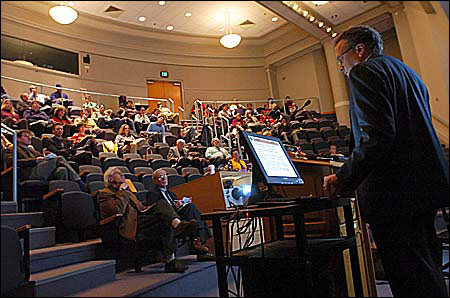Why good doctors do bad things
Ethics body proposed to sort out conflicts between military, medical roles
It seemed clear in the lecture hall at Harvard Medical School’s Medical Education Center Tuesday (March 1) that doctors should help their patients – even when those patients are prisoners – and never, ever become their torturers.

But the reality in the prisons of Iraq, the cells of Guantanamo Bay, and a host of military settings around the world can be far different, according to speakers at the discussion on medical ethics and human rights.
The conflicting aims of the military – to kill or defeat the enemy, and the doctor – to save lives, sets up a situation where military medical doctors can be faced with conflicting loyalties toward the patients they’re supposed to help and the military organization and fellow soldiers they serve with.
Those conflicts sometimes result in a physician advising or participating in “coercive interrogation,” or torture.
The discussion, “Abu Ghraib and Guantanamo: Medical Professionalism, Dual Loyalty, and Human Rights,” was sponsored by Harvard Medical School’s Division of Medical Ethics. It looked at instances of physicians participating in human rights violations, ranging widely from Nazi death camps, where doctors supervised killings and selected which prisoners would live or die, to torture conducted by totalitarian regimes in nations around the world, to U.S. medical personnel assisting in interrogations of detainees in Guantanamo Bay and in Iraq.
Leonard S. Rubenstein, executive director of Physicians for Human Rights, said the solution to physician participation in these abuses may be structural. Recognizing that the doctors in these situations will have dual loyalties, the decision whether to participate or not should be taken out of their hands.
Rubenstein said Physicians for Human Rights has looked at the problem and proposes a military medical ethics body that would make such decisions away from the area of conflict, keeping in mind the doctor’s ethical obligations toward the good of his or her patient

Rubenstein was joined on the panel by Robert Jay Lifton, Distinguished Professor Emeritus of Psychology and Psychiatry at John Jay College and the Graduate Center of the City University of New York, and by Stephen H. Miles, professor of medicine and a faculty member of the Center for Bioethics at the University of Minnesota Medical School. Associate Clinical Professor of Social Medicine, Medical Ethics and Anaesthesia at Harvard Medical School Mildred Solomon moderated the event.
Miles detailed the participation of U.S. military medical personnel in alleged human rights abuses in Iraq and Guantanamo Bay. Medical personnel were regularly integrated into interrogation teams, providing advice on how much “coercion” an inmate could take and signing off on specific interrogation plans.
Further, Miles asserted, U.S. medical personnel falsified documents to hide injuries and deaths, failed to report human rights abuses, and turned over medical records to aid the design of interrogation plans.
“The first several weeks of reading these documents [detailing practices at Abu Ghraib and Guantanamo Bay], I had nightmares and stress reactions, just from reading,” Miles said.
Rubenstein sought to offer some perspective on the situation of these medical personnel. A doctor approached by a commanding officer for advice on a sleep deprivation program inflicted on a prisoner can reasonably argue that he wants to be sure the program doesn’t do any lasting harm. Similarly, a medic can advise an interrogator on a patient’s physical limitations to avoid serious injury during interrogation.
In these situations, Rubenstein said, it may seem reasonable for a doctor to offer advice, but that advice ultimately makes the doctors complicit in torture. In each case, that information can provide interrogators an idea of a subject’s weaknesses and allow them to exploit those weaknesses.
“There were a lot of bad people involved in these abuses. But there were a lot of good people, too,” Rubenstein said.
Just understanding the problem of dual loyalties and understanding that they may be put in such situations can empower medical personnel to recognize the situations when they come along, and perhaps prompt them to respond differently, Rubenstein said. At the same time, he said, structures such as the proposed military ethics body should be put in place to protect the medical personnel from having to make such decisions.
Dual loyalty situations are nothing new for medical personnel. An extreme case in recent history occurred in Nazi death camps, where doctors supervised killings and selected which people went into the camps and which were killed. Lifton, who interviewed Nazi doctors, said most were normal people who went home on the weekends to be fathers and husbands. They weren’t killers before serving in the death camps and didn’t continue killing afterward, he said. Lifton, who also interviewed U.S. soldiers about atrocities in Vietnam, said there’s an internalization of the ethos of the organization that then prompts actions that the person wouldn’t ordinarily perform.
“Most of such violations are performed by ordinary people who enter into certain situations and succumb to them,” Lifton said. “Ordinary people no better than you or me can enter into a situation where they can commit an atrocity.”




